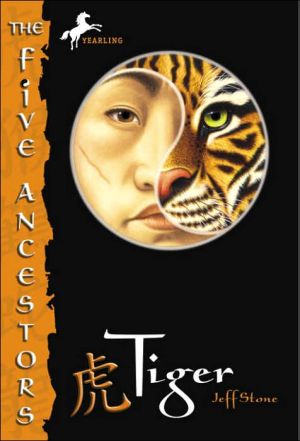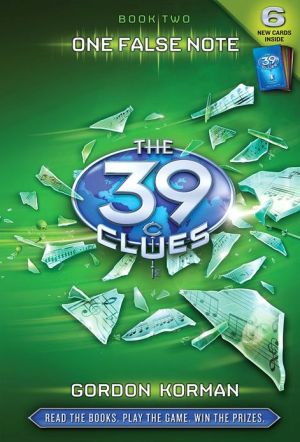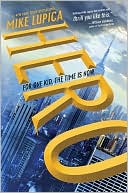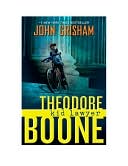Tiger (The Five Ancestors Series #1)
“Tiger clips along at a lightning pace!”—Eoin Colfer\ Twelve-year-old Fu and his temple brothers Malao, Seh, Hok, and Long don’t know who their parents were. Raised from infancy by their grandmaster, they think of their temple as their home and their fellow warrior monks as their family. Then one terrible night, the temple is destroyed by an army led by a former monk named Ying, whose heart is bent on revenge. Fu and his brothers are the only survivors. Charged by their grandmaster to uncover...
Search in google:
Twelve-year-old Fu and his temple brothers Malao, Seh, Hok, and Long don t know who their parents were. Raised from infancy by their grandmaster, they think of their temple as their home and their fellow warrior monks as their family. Then one terrible night, the temple is destroyed by an army led by a former monk named Ying, whose heart is bent on revenge. Fu and his brothers are the only survivors. Charged by their grandmaster to uncover the secrets of their past, the five flee into the countryside and go their separate ways. Somehow, Grandmaster has promised, their pasts are connected to Ying s. Understanding that the past is the key to shaping the future, the first book in the series follows Fu as he struggles to find out more and prove himself in the process. Fu s name literally means "tiger," for he is the youngest-ever master of the fierce fighting style modeled after that animal.Publishers WeeklyIn this launch of the Five Ancestors series, a quintet of orphans live at Cangzhen Temple with their Grandmaster in 17th-century China. "Fu ("Tiger") credibly comes through as alternately sympathetic and maddening, true to his adolescent nature," said PW in a starred review, "and the martial arts scenes will keep even reluctant readers flipping through the pages." Ages 9-12. (Mar.) Copyright 2006 Reed Business Information.
"This is stupid," Fu mumbled from the bottom of the terra-cotta barrel. "How long do we have to stay inside this thing? I feel like a pickled vegetable."\ "Shhh!" warned his brother Malao, lying directly on top of him. "Grandmaster told us to remain perfectly quiet, and perfectly still."\ "I know what Grandmaster said," Fu replied. "But we can't stay crammed in here forever. I say we get out right now. I say we stop hiding and fight!"\ "Calm yourself, Fu," whispered his brother Seh from on top of Malao. "We are all just as cramped and uncomfortable as you are. But we must do as Grandmaster said and remain silent and hidden. The enemy within our walls is unlike any faced by Cangzhen Temple in more than a thousand years."\ "Yeah, yeah," Fu said. "Stop being so dramatic. You guys are sounding more and more like Grandmaster every day. I don't care who's out there. We're all masters now. We've all passed the tests. We shouldn't be hiding like a bunch of girls. We should be--"\ "Hush!" snapped Fu's brother Hok, who was lying on top of Seh. "That's enough, Fu! You're making even me angry now."\ "I don't care!" Fu replied. "If you think--"\ "Quiet!" hissed Fu's oldest brother, Long, from the top of the pile. "Control your tongues, all of you! Brother Fu, empty the words from your mouth and then empty your mind. You must take control of your thoughts and your emotions, or they will control you."\ "You must take control of your thoughts and your emotions, or they will control you," Fu mocked. "Give me a break, Long. Right now we need action, not philosophy."\ Fu was quickly losing his patience. He could hear enemy horses racing up and down the brick pathways that crisscrossed the temple grounds. He also heard weapons clashing and men crying out--plus a terrible, new sound. It was almost like thunder, except every boom was followed by a pain-filled scream. Fu's keen ears recognized each and every scream. Warrior monks were falling.\ A low growl resonated deep within Fu's chest. He didn't understand why his four brothers, stacked above him in the barrel, were holding back. Like him, each had mastered a style of animal kung fu that reflected both his personality and his body type. In fact, their true natures were so perfectly matched with their kung fu styles that they were each named after the animal they mirrored. They were born to fight. But they wouldn't.\ Fu, the tiger, growled again. His brothers didn't look like him, walk like him, talk like him, or even smell like him. And they certainly didn't think like him. He called them "brothers" because they all were Buddhist and lived in the temple together. In reality, he and his "brothers" were orphans. What Fu needed were real brothers. Brothers who would fight alongside him.\ Fu grunted under the weight of the others. "I can't believe we are just going to--"\ "Please!" Long interrupted. "No more talking! We all have to remain silent. Brother Fu, focus your breathing. Meditate like the rest of us have been doing. If you find that you cannot meditate, just lie still and relax."\ "That's easy for you to say," Fu replied. "You're on top. Try lying down here at the bottom of the pile in a pool of water with Malao's nasty feet pressing up against your lips."\ Malao giggled softly and wiggled his toes.\ "If you do that again, Malao, I'll bite them off one at a time," Fu said. "I...
\ Publishers WeeklyIn this launch of the Five Ancestors series, a quintet of orphans live at Cangzhen Temple with their Grandmaster in 17th-century China. "Fu ("Tiger") credibly comes through as alternately sympathetic and maddening, true to his adolescent nature," said PW in a starred review, "and the martial arts scenes will keep even reluctant readers flipping through the pages." Ages 9-12. (Mar.) Copyright 2006 Reed Business Information.\ \ \ \ \ School Library JournalGr 6-9-Essentially a graphic novel without the graphics, this book (the first of five) should have broad appeal to readers who love computer games and Japanese anime. As the story begins, five orphans, being raised as foster brothers and Buddhist monks in 17th-century China, are hiding in a large water jar as imperial forces, led by their renegade older brother, Ying, attack and slaughter their temple's residents. Grandmaster has given the boys animal names and has trained each of them in a martial-arts style related to his titular animal's strengths. He intends the five to escape, even if everyone else dies. Fu-the "tiger"-is this book's main character; in addition to remaining free, he is determined to reclaim the valuable ancient training scrolls that Ying has taken from the temple. Fu finds friends in unexpected places and learns to control the impulses he has fought against all of his life. Teens are likely to warm to the implicit theme that each person has a particular destiny, an inborn sense of identity that must be brought to light. While quite a page-turner, employing slapstick humor from time to time in true manga style, Tiger is nonetheless an adventure story and not a more serious work of finding one's self and one's place in the world. Cheryl Aylward Whitesel's Blue Fingers (Clarion, 2004) is a fine story that also examines those topics.-Coop Renner, Hillside Elementary, El Paso, TX Copyright 2005 Reed Business Information.\ \ \ Kirkus ReviewsFive young brothers, each master of a different kung fu style, flee the destruction of their hidden monastery in this unpolished but energetic martial-arts series opener. Here, Fu (Cantonese for "Tiger," as the author repeatedly explains), the largest and most hot-headed of the quintet, struggles to master both his temper and a host of soldiers led by older-brother-gone-to-the-bad Ying, while several times saving and losing a precious set of scrolls that lay out the deepest secrets of kung fu. Stone is better at describing gruesomely effective fighting techniques than at dialogue-"He let me loose, and now we're even. If he ever stands between me and the scrolls, he'll taste my fist!"-but fans of lower-budget martial-arts films, or for that matter the character interplay that animates Lensey Namioka's samurai adventures (which are set at roughly the same time), will find themselves on familiar ground. Readers hoping for the wild twists and epic sweep of L.G. Bass's Sign of the Qin (2004) may be disappointed, though, and several plot threads are left a-dangling. (Fiction. 11-13)\ \








